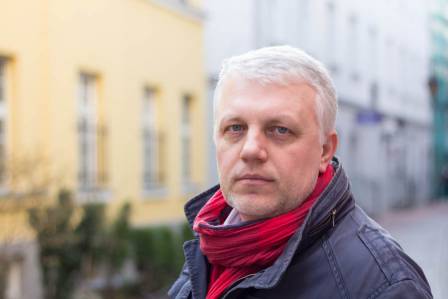Journalists & rights activists warn against continuing "real tradition of impunity" a year after Pavel Sheremet’s murder

It is exactly one year since Pavel Sheremet, the renowned Belarusian journalist and former prisoner of conscience was killed in Kyiv by a car bomb. Friends and fellow journalists are holding a gathering to mark a Year without Pavel at 8.00 on July 20, 2016. From the place where he died, they will walk in procession to the SBU [Security Service], President’s Administration and Interior Ministry, where they will be demanding a more effective investigation.
Pavel Sheremet was killed almost exactly two years after leaving Russian ORT in protest at the virulent warmongering propaganda against Ukraine. He had been living since then in Kyiv with his partner, Olena Prytula, the former Chief Editor and a co-founder, together with slain journalist Georgy Gongadze, of Ukrainska Pravda.
There is video footage showing two people – a man and a woman planting the explosive device under the car during the night. Since the car belonged to Prytula, it remains possible that those who organized the killing either planned to kill her, or did not care which of the two prominent journalists they killed. Prytula was placed under police protection after the killing.
An appeal signed by many prominent media figures and human rights activists was posted on the eve of the anniversary on Ukrainska Pravda.
The authors remind President Petro Poroshenko that a year ago he named the solving of this crime a “matter of honour” for the country. A special investigative team was formed, and the responsibility for following the investigation placed with the Prosecutor General’s Office, with the SBU to work with the investigators.
Despite all of this, the authors point to the ineffectiveness of the investigation and recall the Slidstvo.info investigation which exposed major omissions in the work of the authorities. This included not questioning important witnesses whom video footage had shown were in the area when the bomb was being planted. Most damningly, crucial CCTV footage showing the two people suspected of planting the bomb had either not been found, or not taken into consideration.
It was only after the Slidstvo.info film was broadcast in May this year that the former SBU official, whom they believe may have been following Sheremet that night, was questioned.
The authors believe that all of this fails to meet the criteria for an effective investigation, which should work swiftly and thoroughly, be independent, objective and accountable to interested parties. This undermines public trust.
They note that Ukraine has a long tradition of impunity in cases involving attacks and killings of journalists, and warn that without radical changes to the organization of this investigation, that Pavel Sheremet’s murder could become the next in a long list of such crimes where the perpetrators were not brought to justice.
They call on the President, Interior Minister, the Prosecutor General and head of the SBU to:
Organize an investigative group within the Department of Special Investigations, enlisting highly qualified investigators from the EU, UK and USA.
Hold regular public briefings, reporting on the progress of the investigation.
They ask the EU, UK and USA to provide assistance and support the inclusion of an international element into the investigation. They believe that this murder is a true test of the Ukrainian authorities’ ability to investigate attacks on freedom of the media.
In separate comments to PEN International, Mykola Riabchuk, the head of PEN Ukraine, expressed wariness of attempts seen in some statements from abroad to suggest some kind of sinister sabotage, or worse, from the Ukrainian government. While he shares the frustration at the lack of progress, he believes “it says more about the high professionalism of the Russian agents and low professionalism of Ukrainian investigators.”
He also insists that we should not ignore the murder, under similar circumstances of two top Ukrainian intelligence officers, and the killing of former Russian MP Denis Voronenkov who had begun providing Ukraine with vital and highly incriminating testimony about Russia’s role in the invasion of Crimea and more.





